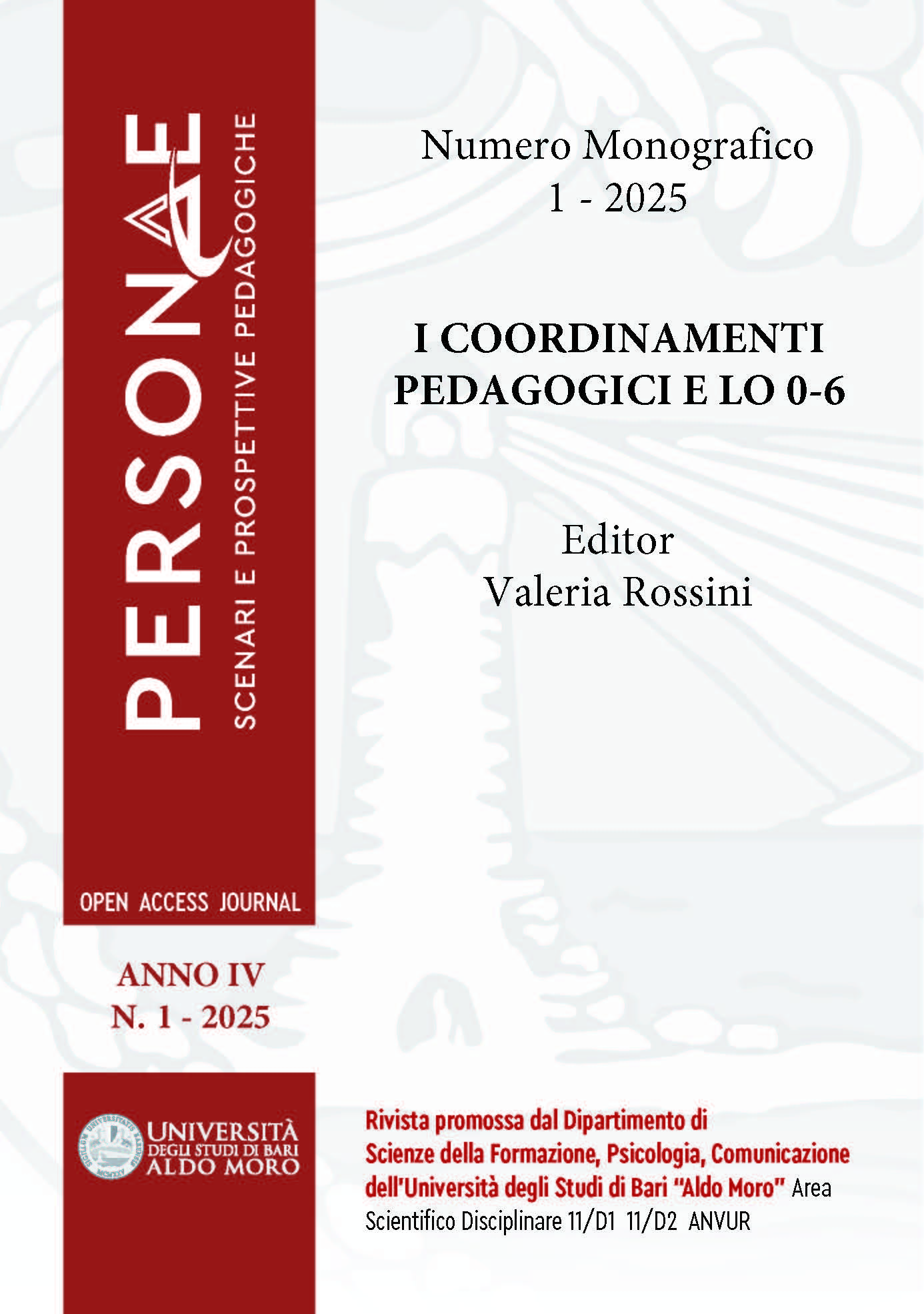Formazione professionale e continuità educativa nel sistema integrato 0–6. Risultati di un progetto di ricerca-formazione
Parole chiave:
Infanzia, Ricerca-formazione, sistema integrato 0-6, continuità educativa, agencyAbstract
Il contributo presenta gli esiti di un progetto triennale di ricerca-formazione (Asquini, 2018) attivato nel comune di Putignano (BA) e volto a promuovere l’interazione tra educatrici impegnate nei servizi 0-3 e insegnanti di scuola dell’infanzia. In linea con il D. Lgs. 65/2017 e con le indicazioni promosse dalle Linee pedagogiche per il sistema integrato zerosei (D.M. 334/2021), l’indagine, di tipo partecipativo, ha favorito processi riflessivi (Biesta, 2009) rispetto a tematiche quali gioco, spazio, tempo e linguaggi STEAM (Bondioli, Savio, 2018). I risultati evidenziano un rafforzamento dell’agency e della progettualità educativa in ottica verticale, mostrando il potenziale trasformativo delle comunità di pratica (Balduzzi, Manini, 2013) e la necessità di strutturare percorsi dialogici sostenuti da politiche territoriali strutturali.
The article presents the outcomes of a three-year research-training (Asquini, 2018) project carried out in Putignano (Bari), aimed at fostering structured collaboration between early childhood educators and preschool teachers. In accordance with Legislative Decree 65/2017 and the principles set out in the Pedagogical Guidelines for the Integrated 0–6 System (Ministerial Decree 334/2021), the participatory investigation promoted reflective processes (Biesta, 2009) on key themes such as play, environment, time, and STEAM languages (Bondioli, Savio, 2018). Findings highlight the strengthening of professional agency and vertically integrated planning skills, revealing the transformative potential of communities of practice (Balduzzi, Manini, 2013) and the need to design dialogic pathways supported by coherent and long-term local education policies.
Riferimenti bibliografici
Asquini, G. (2018). La ricerca-formazione. Milano: FrancoAngeli.
Balduzzi, L., & Manini, M. (a cura di) (2013). Professionalità e servizi per l’infanzia. Roma: Carocci.
Bandura, A. (2009). Exercise of human agency through collective efficacy. Current Directions in Psychological Science, 9, 75–78.
Ben-Peretz, M. & Flores, M.A. (2018). Tensions and paradoxes in teaching: Implications for teacher education. European Journal of Teacher Education, 41(2), 202-213.
Biesta, G.J.J. (2009). Good education in an age of measurement: On the need to reconnect with the question of purpose in education. Educational Assessment, Evaluation and Accountability, 21: 33-46.
Bobbio, A. & Savio, D. (2019). Bambini, famiglie, servizi. Verso un sistema educativo integrato per l’infanzia. Milano: Mondadori Education.
Bondioli, A., Savio, D. (2018). Educare l’infanzia. Temi chiave per i servizi 0-6. Roma: Carocci.
Cigala, A., Venturelli, G., & Bassetti, C. (2019). A longitudinal training for educators in early childhood education and care centres: Effects on their perceived self-efficacy, sense of belonging, and agency. Frontiers in Psychology, 10: 2574.
Egert, F., Dederer, V., & Fukkink, R.G. (2020). The impact of in-service professional development on the quality of teacher-child interactions in early education and care: A meta-analysis. Educational Research Review, 29, 100309.
European Commission/EACEA/Eurydice/Eurostat (2014). Key Data on Early Childhood Education and Care in Europe. Luxembourg: Publications Office of the European Union, in https://op.europa.eu/en/publication-detail/-/publication/4bda53c1-7352-11e5-86db-01aa75ed71a1/language-en.
Giroux, H.A. (1992). Border Crossings. Cultural Workers and the Politics of Education. London: Routledge.
Han, H. S., Blank, J., & Berson, I. R. (2020). Reforming early childhood teacher education in the policy context: A self-study of teacher educators. Journal of Early Childhood Teacher Education, 41(4), 306–324.
Juutilainen, M., Metsäpelto, R.L., & Poikkeus, A.M. (2018). Becoming agentic teachers: experiences of the home group approach as a resource for supporting teacher students' agency. Teaching and Teacher Education, 76, 116–125.
Lazzari, A. (a cura di) (2016). Un quadro europeo per la qualità dei servizi educativa e di cura per l’infanzia: proposta di principi chiave. San Paolo d’Argon (BG): Zeroseiup.
Leijen, Ä., Pedaste, M., & Lepp, L. (2020). Teacher agency following the ecological model: how it is achieved and how it could be strengthened by different types of reflection. British Journal of Educational Studies, 68, 295–310.
Leijen, Ä., Pedaste, M., & Lepp, L. (2022). Supporting teacher agency during a collaborative inquiry-based in-service teacher education course. European Journal of Teacher Education, 47(4), 769–786.
Matolic, T., Jurakic, D., Greblo Jurakic, Z., Marsic, T., & Pedisic, Z. (2023). Development and validation of the EDUcational Course Assessment TOOLkit (EDUCATOOL). Frontiers in Education, 8(1314584), 1-9.
MIM (2023). Linee guida per le discipline STEM, in https://www.mim.gov.it/web/guest/-/nota-prot-4588-del-24-ottobre-2023.
MIM, Decreto Legislativo 13 aprile 2017 n. 65 - Istituzione del sistema integrato di educazione e di istruzione dalla nascita sino a sei anni, in https://www.gazzettaufficiale.it/eli/id/2017/05/16/17G00073/sg.
MIM, Decreto Ministeriale 22 novembre 2021, n. 334 - Adozione delle Linee pedagogiche per il sistema integrato zerosei, in https://www.mim.gov.it/documents/20182/5385739/Decreto+ministeriale+n.+334+del+22+novembre+2021.pdf/e2b021b5-4bb5-90fd-e17a-6b3af7fc3b6f?version=1.0&t=1640603375461.
MIM, Legge 13 luglio 2015 n. 107 - Riforma del sistema nazionale di istruzione e formazione e delega per il riordino delle disposizioni legislative vigenti, in https://www.mim.gov.it/documents/20182/0/Legge+n.+107+-+13+luglio+2015+art.+1,+commi+45-52.pdf/b2c4e165-6680-4a96-b183-d464abe8d169?version=1.0&t=1494852903793.
Molla, T., & Nolan, A. (2020). Teacher agency and professional practice. Teachers and Teaching, 26(1), 67-87.
Mortari, L. (2004). Apprendere dall’esperienza. Il pensare riflessivo nella formazione. Roma: Carocci.
Nigris, E. (a cura di) (2004). La formazione degli insegnanti. Percorsi, strumenti, valutazione. Roma: Carocci.
Oosterhoff, A.M., Oenema-Mostert, Ineke, C., & Minnaert, A. (2020). Aiming for agency. The effects of teacher education on the development of the expertise of early childhood teachers. Teaching and Teacher Education, 96: 103176.
Schön, D.A. (2006). Formare il professionista riflessivo. Per una nuova prospettiva della formazione e dell’apprendimento nelle professioni. Milano: FrancoAngeli.
Syslová, Z. (2019). The relation between reflection and the quality of a preschool teacher’s education performance. International Journal of Child Care and Education Policy, 13(4), 1-21.
Tripp, T., & Rich, P. (2012). Using video to analyze one's own teaching. British Journal of Educational Technology, 43(4), 678–704.
Wu, Z., Huang, L. A., Liu, Y. K., & Chiang, F. K. (2024). Developing a framework of STEM literacy for kindergarten children. Research in Science Education, 54(4), 621-643.







